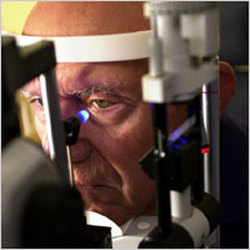Diabetic Eye Exams
|
Diabetic retinopathy is a condition which causes progressive damage to the retina, the light sensitive lining at the back of the eye. It is a serious sight threatening complication of diabetes.
Diabetic retinopathy is a result of damage to the tiny blood vessels that nourish the retina. They leak blood and other fluids that cause clouding of the vision. The condition usually affects both eyes. The longer a person has diabetes, the more likely they are to develop diabetic retinopathy. If left untreated diabetic retinopathy can cause blindness. |
All people with diabetes - both type 1 and type 2 are at risk. That's why everyone with diabetes should get a comprehensive dilated eye exam once a year. Between 40 to 45 percent of Americans diagnosed with diabetes have some stage of diabetic retinopathy. If you have diabetic retinopathy, your doctor can recommend treatments to help prevent its progression.
If you have diabetic retinopathy, you may need an eye exam more often. People with proliferative retinopathy can reduce their risk of blindness by 95 percent with timely treatment and appropriate follow up care.
During the first three stages of diabetic retinopathy, no treatment is needed, unless you have macular edema. Proliferative retinopathy is treated with laser surgery. However the diabetes control and complications trial showed that better control of blood sugar levels slows the onset and progression of retinopathy. The people with diabetes who kept their blood sugar levels as close to normal as possible also had much less kidney and nerve disease. Better control also reduces the need for sight-saving laser surgery.
Often there are no visual symptoms in the early stages of diabetic retinopathy. That is why the American Optometric Association recommends that everyone with diabetes have a comprehensive dilated eye exam once a year. early detection and treatment can limit the potential for significant vision loss from diabetic retinopathy.
Diabetes: American Diabetic Association
www.diabetes.org
www.diabetes.org
